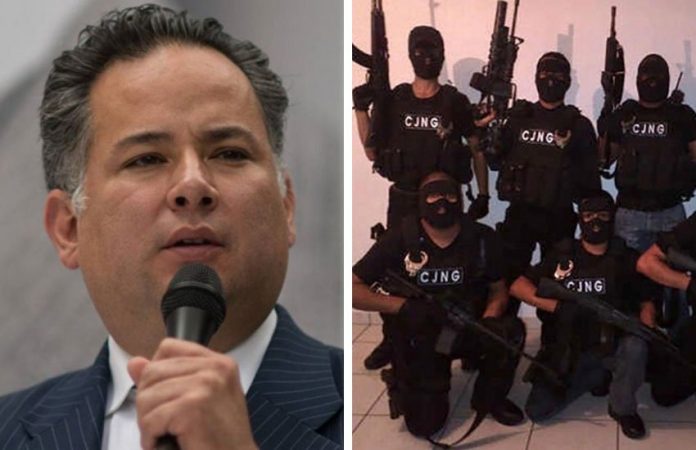In its first week in office, the new federal government has taken aim at the finances of the Jalisco New Generation Cartel (CJNG), considered Mexico’s most powerful and dangerous criminal organization.
Santiago Nieto, the new head of the Financial Intelligence Unit (UIF), a division of the Secretariat of Finance (SHCP), told the news agency Reuters yesterday that he had filed a criminal complaint against three businesses and seven people with links to the cartel.
The SHCP said in a statement Wednesday that it had filed its first money laundering complaint with the federal Attorney General’s office (PGR) “against members of organized crime” but didn’t identify which organization they belonged to.
“The administration of President . . . López Obrador has reiterated that combatting the financial structures of organized crime is a priority and this action is a firm step towards the pacification and wellbeing of the nation,” the statement said.
The complaint, the SHCP said, would allow “the commencement of legal investigations” against those it identified.
Nieto, who served as the top electoral crimes prosecutor in the past government before being dismissed in October 2017, said he was able to quickly file the complaints against the CJNG associates because they already appear on the United States Treasury’s Office of Foreign Assets Control (OFAC) black list of drug traffickers.
The early move against the CJNG marks the beginning of a new effort by the government to shed Mexico’s reputation for being weak on action against cartel finances.
“I am convinced the best way to prevent criminal behavior is by sending a message that these types of acts that violate trust and social norms will be punished,” Nieto said.
He explained that the new government wanted to send an early message that it would focus on taking legal action against criminal organizations “and especially seek to impose penalties.”
Although authorities have captured cartel kingpins such as Joaquín “El Chapo” Guzmán – currently on trial in New York – the war on drugs, launched by former president Felipe Calderón 12 years ago, still rages on.
A power vacuum created by Guzmán’s arrest as well as cartel splintering have triggered vicious turf wars which contributed to last year’s homicide figures being the highest in at least two decades.
As violence surged, massive quantities of illicit drugs continued to cross the border into the United States and in recent years, the CJNG significantly increased its power and extended its reach, gaining significant notoriety in 2015 when its members shot down a military helicopter in southern Jalisco. It wasn’t until this year that authorities arrested those allegedly responsible for the attack.
Among the highest profile crimes the cartel is alleged to have committed in 2018 are the torture and murder of three students in Guadalajara, an attack on state Labor Secretary Luis Carlos Nájera, also in the Jalisco state capital, and the disappearance of three Italian men in Tecalitlán.
In October, the United States government doubled the reward being offered for suspected CJNG leader Nemesio “El Mencho” Oseguera Cervantes to US $10 million while Mexico has offered a 30-million-peso (US $1.5-million) reward for information leading to his arrest.
Oseguera’s wife, Rosalinda González Valencia, allegedly the administrator of the economic and legal resources of the CJNG, was arrested in May but freed on a bail of almost 1.6 million pesos (US $82,000 at the time) in September.
Statistics show that between September 2017 and the end of June this year, the PGR didn’t obtain a single successful conviction against a CJNG member while the previous year only seven Jalisco cartel members received jail sentences.
While the federal government and the United States Drug Enforcement Administration consider the cartel Mexico’s most powerful, those statistics provide evidence that it is also the safest from prosecution.
In addition, the Financial Action Task Force (FATF), an intergovernmental organization that sets worldwide standards for combating illicit finance, criticized Mexico at the beginning of this year for systematically failing to bring money launderers to justice.
A FATF report cited data from the Financial Intelligence Unit that showed that already low prosecution levels were declining further.
Nieto said the rate had continued to decline this year, a situation he described as “alarming” in a separate interview with the newspaper El Financiero.
“In particular, it’s serious that the PGR hasn’t carried out actions to follow up on these complaints in order to prosecute the cases before judges and bring those responsible before Mexican courts,” he said.
The anti-money laundering chief said the new government would focus on filing more criminal complaints, freezing more bank accounts and seizing more assets from criminals.
Nieto also said that the López Obrador-led administration would prioritize combatting pipeline petroleum theft, a crime that new security secretary Alfonso Durazo singled out as a key contributing factor to the high levels of violence.
The government is expected to announce an anti-fuel theft strategy next week.
Source: Reuters (en), El Financiero (sp)
